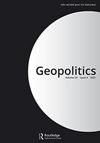Temporality and the Geopolitical Enframing of Chinese International Development Thinking
IF 3.4
1区 社会学
Q1 GEOGRAPHY
引用次数: 1
Abstract
ABSTRACT Over the past 5–10 years, a growing number of Chinese scholars and policy experts have sought to theorise the ‘development’ of other peoples and places in the Global South. These intellectual efforts include building temporal frameworks for describing development processes, and often, an implicit set of directives for effecting positive change. Drawing on eight months’ fieldwork in Beijing, this paper examines the representational practices of depicting development and its temporal dimension that have been mobilised in the ongoing production of Chinese international development thinking. In particular, it is concerned with the ways in which temporal distance and proximity have been constructed to provide a theoretical and moral justification for China’s intensifying geopolitical and economic preoccupations. We argue that more than a system of explanations, current Chinese thinking contains and expresses a recalibrated will to geopolitical power, which has had a conditioning effect on the enframing of the meanings and relations of development.中国国际发展思维的时代性与地缘政治框架
摘要在过去的5-10年里,越来越多的中国学者和政策专家试图对全球南方其他民族和地区的“发展”进行理论分析。这些智力上的努力包括建立描述开发过程的时间框架,通常还有一套实现积极变革的隐含指令。通过在北京八个月的实地考察,本文考察了在中国国际发展思想的不断产生中,描绘发展及其时间维度的代表性实践。特别是,它关注的是时间距离和接近度的构建方式,为中国日益加剧的地缘政治和经济关注提供了理论和道德上的理由。我们认为,当前的中国思想不仅仅是一个解释体系,它包含并表达了对地缘政治权力的重新调整的意愿,这对发展的意义和关系的形成产生了制约作用。
本文章由计算机程序翻译,如有差异,请以英文原文为准。
求助全文
约1分钟内获得全文
求助全文
来源期刊

Geopolitics
Multiple-
CiteScore
7.60
自引率
10.30%
发文量
50
期刊介绍:
The study of geopolitics has undergone a major renaissance during the past decade. Addressing a gap in the published periodical literature, this journal seeks to explore the theoretical implications of contemporary geopolitics and geopolitical change with particular reference to territorial problems and issues of state sovereignty . Multidisciplinary in its scope, Geopolitics includes all aspects of the social sciences with particular emphasis on political geography, international relations, the territorial aspects of political science and international law. The journal seeks to maintain a healthy balance between systemic and regional analysis.
 求助内容:
求助内容: 应助结果提醒方式:
应助结果提醒方式:


